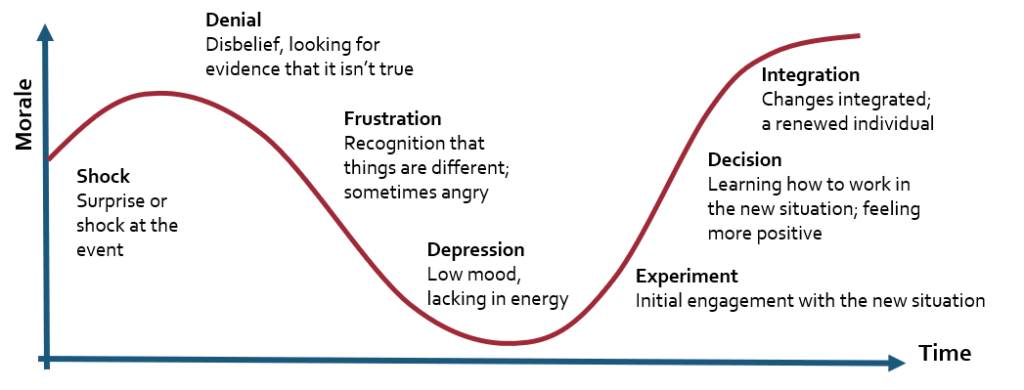Everyone effected by change will go through different stages of emotion. The person confronting or supporting their friend will go through this, just as the person going through the change. Each person will react differently as they experience it. If you discover your friend is an alcoholic, then you may be in denial – “they’re only a social drinker”, or their partner might be in depression – “Our family has collapsed”, whereas the alcoholic might have been in through the worst of it, and on the road to change just at the time other people discover their history.

There are typically 5 major stages in the change curve
Shock and Anger
People may procrastinate when they experience shock. Feelings of shock and anger can be fleeting or last a long time, depending on how resilient people are. People feel trapped and respond fearfully.
Allow them to let off steam and reassure them that the change is temporary, and things are going to get better. Stress that the change is not personal. Subtly work to help people change their map of the world, because people react on what their map tells them to do or I how to react.
Denial
They may have a false perception about their ability to cope. They may think that they can handle things. They think everyone else is to blame. They can stay locked in this stage and become dinosaurs who can’t cope with change
Coaching helps. The tool is to give feedback, because without feedback they don’t realise that they’re in denial and deluding themselves
Frustration and Self-Awareness
They may feel worse as they realise their tool kit of skills and knowledge isn’t good enough to cope with the change. They go into survival mode. The state of feeling bad and inadequate can spill into other areas of their lives
Here, they need support and to know where they are on the change curve and why they’re feeling bad. People feeling like this need to tell their spouse, colleagues and manager and ask for leeway to be grumpy and scared. They need to be given permission to feel bad and behave unresourcefully.
Acceptance
They start to take personal responsibility for dealing with change as they realise they have finally stopped resisting the change. People’s perception of their abilities is incorrect because they feel useless.
This stage is where people are shown how other people coped with change by giving them case studies, coaching and exemplars to model.
Experiment
This stage is the learning and integration of new tools, so people start modelling others to see how they feel with change They feel more capable and competent
Training people to acquire new skills and give them room to make mistakes. At this stage, others must have done sufficient risk analysis and contingency planning, so that mistakes aren’t detrimental to them. Risk management is necessary at this point so that mistakes can be handled and dealt with appropriately. A blame culture only kicks people back to stage 2 (denial)